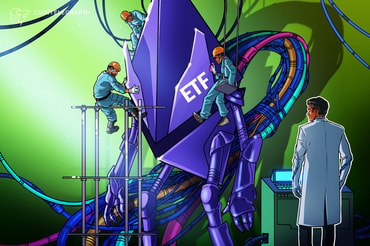EigenLayer’s Token Launch Draws Scrutiny Over Supply Concerns

Election 2024 coverage presented by
In some ways, the release of EigenLayer’s native EIGEN token this week went as expected.
The price surged moments after it was listed on exchanges, leading to a price discovery period culminating in a 22% slide from its momentary record high.
But there appears to be a more serious issue brewing, with investors and community members complaining about a lack of transparency regarding token supply.
EIGEN’s total supply is fixed at 1.68 billion and its circulating supply is 186 million. These figures give the asset a fully diluted value of $5.8 billion and a market cap, excluding tokens not in circulation, of $650 million. The issue many community members raise stems from a portion of those locked tokens, which belong to early investors that bought during heavily-discounted funding rounds.
Investors that bought in EigenLayer’s $14.4 million seed round, $50 million Series A and most recent $100 million raise in February now can stake their locked tokens to yield rewards. As it stands, there are 130 million EIGEN tokens staked. Many believed these were all a part of the claimed tokens but in fact, 70 million of these tokens belong to this small group of early investors.
Data availability protocol Celestia suffered a similar issue following its token launch, as early investors staked their dominant TIA stacks to receive tradable rewards, which many then traded away. TIA has plunged 75% since February.
EigenLayer investor TardFiWhale.eth wrote on X that the project recently updated its documents to state that “Eigen Labs investors are not restricted from staking” and that rewards are not subject to lock-ups. The X post claims this information wasn’t in an archived document from mid-September.
EigenLayer’s blog post on “token disclosures” was last revised on Sept. 30.
“Transparency will enable us to engage in more honest and open discussions about these issues,” TardFiWhale.eth wrote. “I personally believe that allowing investors with locked EIGEN to stake makes sense from a governance perspective, given the complexity and goals of Eigenlayer. However, I also believe that the rewards earned from staking should be locked until the cliff is reached” at the end of the 12-month vesting period.
EigenLayer allocated 86 million tokens to early adopters including node operators and stakers, but even this has led to criticism as whales were able to receive disproportionate rewards compared to the general population. Tron founder Justin Sun received an airdrop worth $8.75 million, almost all of which was deposited to HTX, the exchange formerly known as Huobi, according to data provider Arkham.
HTX made the following statement in regards to Sun’s wallet: “We categorically deny any connection between the mentioned wallet address and Justin Sun, Global Advisor of HTX, or any member of his team. There is absolutely no evidence to support such claims. HTX maintains a policy of not commenting on the transactions of individual wallet addresses.”
EIGEN recently traded at $3.57, having initially surged as high as $4.39, CoinMarketCap data shows.
An EigenLayer spokesperson offered no comment by press time.
UPDATE Oct 3, 14:27 UTC: Add statement from HTX.
Edited by Marc Hochstein.
Disclosure
Please note that our privacy policy, terms of use, cookies, and do not sell my personal information have been updated.CoinDesk is an award-winning media outlet that covers the cryptocurrency industry. Its journalists abide by a strict set of editorial policies. CoinDesk has adopted a set of principles aimed at ensuring the integrity, editorial independence and freedom from bias of its publications. CoinDesk is part of the Bullish group, which owns and invests in digital asset businesses and digital assets. CoinDesk employees, including journalists, may receive Bullish group equity-based compensation. Bullish was incubated by technology investor Block.one.
Oliver Knight is a CoinDesk reporter based between London and Lisbon. He does not own any crypto.

Published on Other News Site












